24th November 2015
Contributing Writer for Wake Up World
Nine people are dead, with an additional 19 unaccounted, following two iron ore mining dams bursting in Brazil’s Minas Gerais region. The town of Bento Rodrigues was completely destroyed by the 60 million cubic meters of toxic mud — the equivalent of 25,000 Olympic sized swimming pools — as it makes its journey to the Atlantic ocean. The Guardian described the disaster as a “slow-motion environmental catastrophe”.
The water supply for hundreds of thousands of residents has also been devastated. The national water agency has issued a warning that the Rio Doce, otherwise known as “Sweet River,” is now contaminated with arsenic, zinc, copper and mercury, rendering the water unfit for human use. The once thriving ecosystem is now a wasteland for much of the aquatic life along the 500km length of the river, due to lack of oxygen and high temperatures. Families are advised to wash thoroughly and discard any clothing that came in contact with the mud.
“It is a tragedy of enormous proportions,” said Marilene Ramos, president of Ibama, the federal environmental agency. “We have thousands of hectares of protected areas destroyed and the total extinction of all the biodiversity along this stretch of the river.”
When the thick mud hardens, it will make farming arduous. And the entire watershed could change as the silt settles along the bottom of the river. Some of the elements found in the wastewater are not biodegradable and are exceptionally toxic to aquatic organisms. The compounds can raise pH levels as well, creating further environmental harm. This has raised many unanswered questions about the potential future impacts of the toxic wastewater not only on residents’ health, but also agriculture and the long-term ecology of the entire region.
“Many regions will never be the same,” said Klemens Laschesfki, professor of geosciences at the Federal University of Minas Gerais.
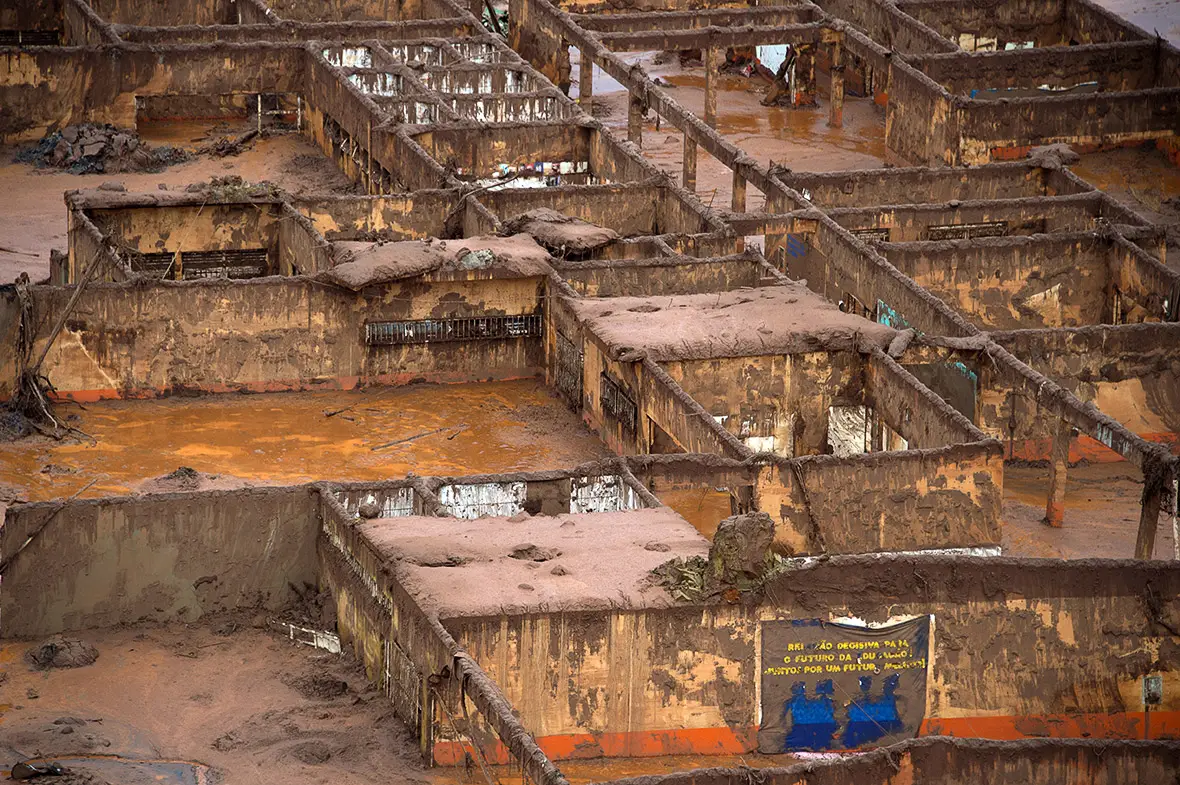
The city of Bento Rodrigues suffered the most damage — over 600 people lost their homes, eleven people perished and 15 remain missing. The muddy red sludge from the mine has effected 635 municipalities.
President Dilma Rousseff compared the scale of damage to that of the 2010 BP Deepwater Horizon oil spill in the Gulf of Mexico.
Meanwhile, two more dams at the same mine are also at risk of bursting and are undergoing emergency repairs.
Mining operators should be subject to “exemplary punishment”:
“We are determined to hold responsible those who are responsible for this”, said President Rousseff. “Who is responsible? A private business, Samarco – a big business that has Vale and BHP Billiton as partners.”
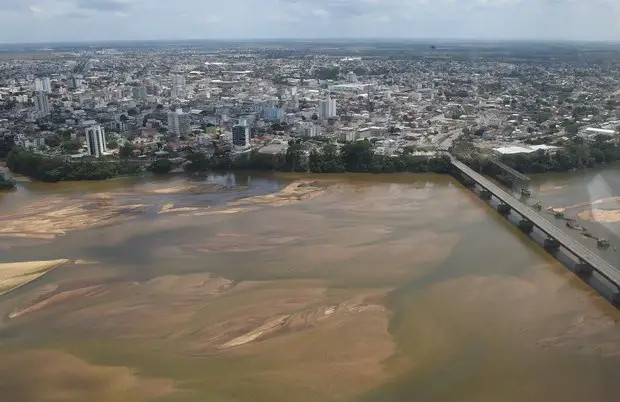
Brazil’s environmental regulator has imposed preliminary fines equivalent to US$94.4 million against the Samarco mining company, which is jointly owned by Vale and BHP Billiton, for violations including river pollution and damage to urban areas.
Sandra Cureau, Brazil’s deputy attorney-general, said the companies should be subject to “exemplary punishment” due to their carelessness in preventing the tragedy or having a disaster action plan. An alarm system was also lacking. The state environment prosecutor asserted: “This is no accident. It is a mistake in operation and negligence in the monitoring… Vale and BHP were completely careless in terms of prevention. There has been a total lack of concern with the victims.”
Moreover, the Brazilian organization Instituto Pristino expressed concerns back in 2013 about the integrity of the tailings dam and urged that renewal of the license be denied. Apparently, this appeal was disregarded.
Brazilian federal and state prosecutors have now announced plans to investigate whether criminal actions on the part of the mining operator contributed to this disaster, in addition to violations already found by the state.
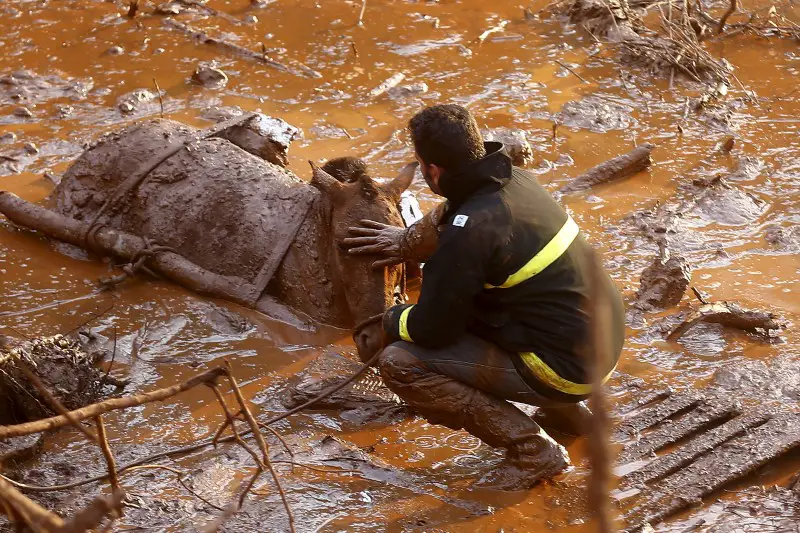
Stocks Plummet, Along With Human Decency:
While the devastation continues to unfold, speculations about investor loss are heating up.
BHP reacted quickly to minimize damage, with chief executive Andrew Mackenzie making a site visit and offering sympathy to the workers and community members. The management of Samarco mine posted an “Announcement to Society” on its website, communicating its ongoing efforts of transparency. And Vale responded with the following statement from Murilo Ferreira, CEO and president:
“We would like to express our solidarity to all affected by this accident at Samarco’s tailings dams in the state of Minas Gerais. We will do everything in our power to offer all the necessary support to Samarco and the authorities at this sad time for employees, their family members and the neighboring communities.”
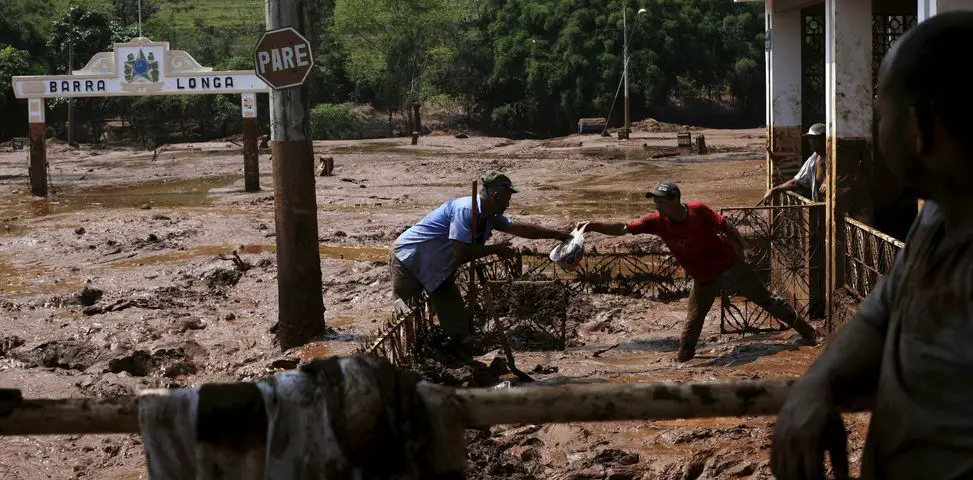
Regardless of extensive public relation efforts to safeguard the companies’ reputations, the stock market quickly reflected the implications of the disaster. BHP shares dropped considerably following the disaster in Brazil, and investors are facing their lowest returns from their BHP shares in years.
Fund manager, Roger Montgomery, runs the Montgomery Fund, and thinks the miner is a bad investment.
“The share price today is lower than where it was in 2007, lower than where it was in 2006, and on par with where it was in 2005,” Mr Montgomery said. “Isn’t that appalling, after ten years you’ve not achieved a return that is as good as probably what you could get in a bank,” he told PM [ABC News] in an interview. [Source]
What’s truly appalling is the focus on profit before humanity, wildlife and the environment.
The true casualties of this mine catastrophe are those residents who lost their homes, livelihood and well-being, along with countless animals that lost their lives, and the ecosystems that support them — not investors.
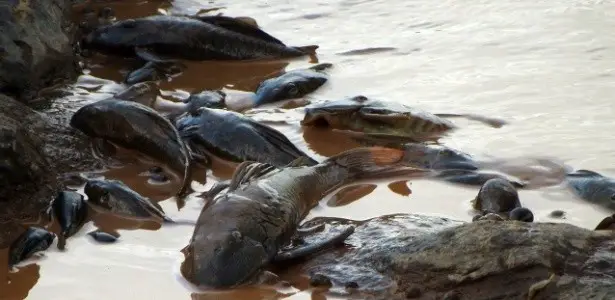
A Billion Dollar Disaster:
With preliminary analysis, Deutsche Bank estimates that it will cost more than $1-billion US to clean up the mine and the communities affected by the dam failure. If the mine reopens at all, it won’t happen until 2019.
Additionally, the loss of trust by workers and communities is another pressing issue. As noted by The Conversation, rebuilding trust will require an ethical and empathetic approach, one that demonstrates genuine concern for vulnerable people and the ecosystem — far surpassing the notion of profit and risk management.
“The question is whether multinational managers are capable of such leadership in times of disaster and can they translate this concern into business as usual. The future of the mining industry depends on such a shift in thinking.”
Brazilian Fukushima — A Rio Doce Disaster:
Article sources
- www.theguardian.com/business/2015/nov/13/brazils-slow-motion-environmental-catastrophe-unfolds
- www.abc.net.au/news/2015-11-13/bhp-billiton-shares-slump-to-lowest-in-ten-years/6940174
- www.theconversation.com/how-bhp-and-vale-react-next-to-brazilian-dam-failure-will-be-critical-50405
- www.beta.iol.co.za/business/international/burst-dams-brazilians-without-water-1945821
- www.theage.com.au/comment/brazilian-dam-disaster-shows-bhp-falls-short-of-global-expectations-20151118-gl2i8c.html
- www.vale.com/brasil/EN/aboutvale/news/Pages/nota-acidente-samarco.aspx
- www.afr.com/business/mining/iron-ore/brazils-dilma-rousseff-surveys-dam-disaster-site-20151112-gkxutn
- www.smh.com.au/business/mining-and-resources/bhp-billiton-vale-face-fresh-problems-at-samarco-20151117-gl1k2x.html
Previous articles by Carolanne Wright:
- Considering the Flu Shot? Here are Five Reasons to Think Twice
- Dr Sebi: The Man Who Cures Aids, Cancer, Diabetes and More
- Plastic-Eating Mushroom Discovered in the Amazon Rainforest — A Solution for Our Trash Saturated World?
- Chronic Lyme Disease: A Modern Plague the Government Chooses to Ignore
- Big Pharma and Organized Crime — They are More Similar Than You May Think
- Over 100 Scientific Studies Agree: Cannabis Annihilates Cancer
- Emotional Energetic Healing: The Future of Medicine is Here
- Why Every Parent Should Consider Unschooling
- The Greenhouse of the Future: Grow Your Own Food Year-Round With This Revolutionary System
- First U.S. City Produces More Electricity Than It Uses — With 100% Renewable Technology
- Autistic Boy with Higher IQ Than Einstein Discovers Gift After Removal from State-Run Therapy
About the author:
 Carolanne enthusiastically believes if we want to see change in the world, we need to be the change. As a nutritionist, natural foods chef and wellness coach, Carolanne has encouraged others to embrace a healthy lifestyle of organic living, gratefulness and joyful orientation for over 13 years
Carolanne enthusiastically believes if we want to see change in the world, we need to be the change. As a nutritionist, natural foods chef and wellness coach, Carolanne has encouraged others to embrace a healthy lifestyle of organic living, gratefulness and joyful orientation for over 13 years
Through her website Thrive-Living.net she looks forward to connecting with other like-minded people from around the world who share a similar vision. Follow Carolanne on Facebook, Twitter and Pinterest.
Source Article from http://wakeup-world.com/2015/11/24/brazils-mining-dam-failure-a-slow-motion-environmental-catastrophe/
Related posts:
Views: 0
 RSS Feed
RSS Feed

















 November 24th, 2015
November 24th, 2015  Awake Goy
Awake Goy 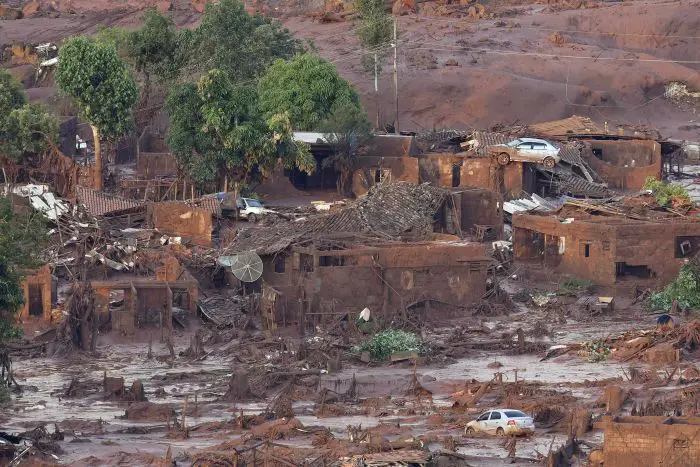
 Posted in
Posted in  Tags:
Tags: 
















